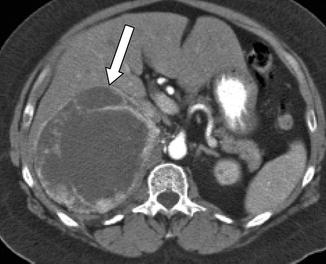Fig. 22.1
Management algorithm for incidentally diagnosed adrenal masses
22.2 Adrenocortical Carcinoma (ACC)
ACC are very rare malignant tumors (1–2 per million per year) [2]. Randomized clinical trials are lacking, and thus, the majority of the data on its management comes from small published series. The malignancy of an adrenal lesion is determined on histology with Weiss score, graded from zero to nine with each of the following criteria administered one point if confirmed on pathology: high mitotic rate, atypical mitoses, high nuclear grade, low percentage of clear cells, necrosis, diffuse architecture of tumor, capsular invasion, sinusoidal invasion, and venous invasion. A score of three or greater is associated with malignancy. Ki67 immunohistochemical staining has been found to be helpful in confirming malignancy and correlating with prognosis [5].
22.2.1 Prognosis
The two major prognostic factors are disease stage and margin status on pathology from initial surgery. In presence of metastatic lesions, the 5-year survival drops from 58–66 % to 0–24 %, and survival is usually less than 13 months [5]. The most common sites for distant disease are the lungs, liver, and bones. Significant prognostic factors include a Weiss score of >3, a mitotic index of >6/10 HPF, and a large tumor burden (>12 cm) [3]. Survival is improved by complete tumor resection, but even in presence of radical resection, relapse is seen in 75–85 % of patients [6]. This supports the need for adequate surgery and adjuvant treatments.
22.2.2 Treatment
Treatment for ACC should consider patient factors and the oncology and potential endocrinology aspects of the tumor.
22.2.2.1 Surgery
Whenever feasible and safe, complete en bloc resection of the primary tumor and distant or recurrent disease should be performed [3, 7]. In particular, the threshold to perform nephrectomy should be low if invasion is suspected, providing preoperative confirmation of bilateral kidneys and good renal function is obtained. Direct invasion of the vena cava or intracaval tumor thrombus does not contraindicate surgery [3]. Surgical debulking may be considered in certain selected cases, but this approach has not demonstrated improvement in survival, and data are lacking to support it. Decision-making factors include the presence of symptomatic hormone hypersecretion, rate of progression, tumor grade, and patient performance status [3]. Debulking mainly serves to control tumor-related endocrine syndromes and possibly to increase the efficacy of other therapies although these patients, due to their reserved prognosis, may be better palliated medically. There is currently no role for neoadjuvant therapy in unresectable tumors. See Fig. 22.2.


Fig. 22.2
A 38-year-old male presenting with an abdominal mass. Contrast-enhanced CT demonstrates a 10-cm right adrenal complex mass (arrow), proven to be adrenal carcinoma at histology (Used with permission from Boland [14])
22.2.2.2 Chemotherapy
The data on the use of adjuvant mitotane come from retrospective studies and the benefit on survival of these data is unclear. A published report [6] has shown that adjuvant mitotane, compared to surgery alone, led to prolonged disease-free survival (42 months vs. 10–25 months) and improved median overall survival (110 months vs. 52–67 months) in completely resected ACC. However, other series [7] have failed to demonstrate the same result. Mitotane should be considered for patients with the highest risk of recurrence, including high-grade disease, intraoperative tumor spillage, and presence of vascular or capsular invasion [6]. When used, a minimal duration of 2 years under the guidance of a medical oncologist is recommended [3]. While receiving mitotane, monitoring includes measurement of ACTH, urinary free cortisol, thyroid function, serum testosterone, lipids, and electrolytes [3]. Adrenal insufficiency must be supplemented, most commonly consisting of glucocorticoid and fludrocortisone. Other side effects include gastrointestinal (nausea, vomiting, diarrhea) and neurologic symptoms (lethargy, confusion, dizziness, ataxia). At this time, no other chemotherapy regimen, alone or in combination with mitotane, has been proven to be more effective than mitotane alone, but some centers do have combination protocols that are considered on a case-by-case basis. In the face of acknowledged palliative setting (locally advanced or metastatic disease), there is no survival benefit demonstrated with mitotane alone or in combination [8].
22.2.2.3 Radiation
ACC was previously thought to be radioresistant. Though not prospectively proven, some studies have shown a reduced local recurrence rate with adjuvant external beam radiation therapy (EBRT) [3]. Possible indications for EBRT include incomplete resection, uncertain resection status, intraoperative tumor violation, positive lymph nodes, diameter of >8 cm with evidence of vascular invasion, and a Ki67 of >10 %. Clear indications include palliation of metastatic disease to the brain and bone and with documented spinal cord compression or superior vena cava syndrome [3]. Radiation may also be considered in the presence of non-resectable persistent or recurrent local disease [3], but preferably administered in symptomatic cases only. It is generally well tolerated with mostly mild to moderate nausea, anorexia, and liver and kidney function impairment.
22.2.2.4 Additional Potential Palliative Treatment Options
Radiofrequency ablation (RFA) can be considered in inoperable patients or in the presence of metastatic disease, where the benefits of surgery are slim and do not outweigh the risks [3]. Its long-term efficacy and effect on survival remain unconfirmed. It is best considered in primary tumors that are <5 cm in diameter, located away from vital structures and large blood vessels [3], and in the treatment of liver metastasis. For arterial embolization, there is limited information, but it may provide adequate palliation of pain and a decrease in hormone production without major side effects [9]. Embolic agents include alcohol foam, stainless steel coils, ethanol, and gelfoam.
22.2.2.5 New Therapies/Under Investigation
Different immunotherapies are being studied in ACC, including the use of dendritic cells and DNA vaccination [3] and cytotoxic adenoviral gene therapy. Many growth factors have been found to be overexpressed in ACC (i.e., vascular endothelial growth factor, epidermal growth factor receptor, and insulin-like growth factor type 2) and may be promising targets as the field of oncogenomics develops.
Stay updated, free articles. Join our Telegram channel

Full access? Get Clinical Tree






